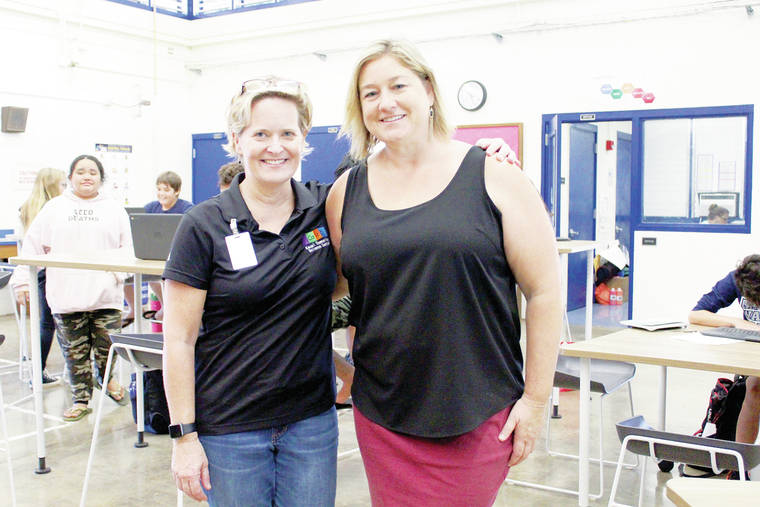WAIMEA — The Kaua‘i Community Science Center, a nonprofit that teaches science literacy to students in Waimea, was awarded a Coronavirus Aid, Relief, and Economic Security (CARES) Act grant of $176,506 from the county in July.
The nonprofit will use the grant to purchase a Ford Transit cargo van, that will serve as a KCSC mobile Wi-Fi hotspot for Westside communities, and to promote science education.
“We plan to establish neighborhood hubs, basically a ‘bus stop’ where the KCSC HOTspot will visit on a regular basis to provide free Wi-Fi, access to resources from other organizations, and STEAM activities and content,” said Sarah Styan, KCSC president and CEO.
“We anticipate one per town from Kekaha to ‘Ele‘ele — Kekaha, Waimea, Kaumakani, Hanapepe, ‘Ele‘ele,” she said. “Kauai Community Science Center’s hotspot brings together resources to improve distance-learning outcomes for students, teachers and parents in the near term, and promote science education now and into the future,” said Styan.
In addition of the purchase of the van, KCSC plans to use the federal funds for other necessities for their programs.
“We also purchased Wi-Fi equipment and other makerspace-related equipment like 3D printers, laser cutter, vinyl cutter, robotics activities, and other related equipment and supplies to support informal science learning/makerspace programming across the wide STEAM, science, technology, engineering, art, culture and math,” said Styan.
“We were able to hire a part-time Program Director, Dr. Marisa Chelius, and a part-time Marketing Director, Quiana Duarte.”
Styan said KCSC plans to partner with more organizations so that it can help to connect students, teachers and parents in the communities and share some fun information science learning opportunities at the same time.
“We were thrilled to receive the Kupa‘a Kaua‘i CARES Act grant,” Styan said.“We are a small organization, and this is making a big impact for us and our ability to work on core-value directives to increase access to science, improve science literacy, promote climate-change awareness and provide a safe and respectful environment for our team and community.”
According to Styan, KCSC has built collaborations with other successful mobile STEAM programs, including Mobile FAB Lab from Carnegie Science Center in Pittsburgh, Pennsylvania, The STE(A)M Truck in Atlanta, and I Am a Scientist Program of Chaminade University in Honolulu.
KCSC’s current status
w The KCSC Transit van with Wi-Fi equipment installed is complete;
w Neighborhood hub locations need tobe established;
w A neighborhood hub committee, with folks who live in each town, is needed to build relationships with the communities that the organization will be working with and get their input on locations, etc., starting in Kekaha next month and moving eastward from there;
w The organization is working on “brown-bag” STEAM activities that can be distributed, as they are not able to execute hands-on activities with students brown bag activities can be done at home or at the site with social distancing;
w The organization is working toward developing different age-range options and a schedule for such;
w The organization has two college and two high school interns, and would welcome more. See the website, kauaicsc.org.
Styan said the KCSC HOTspot project addresses three of the six specific recommendations developed by the Kaua‘i Economic Recovery Strategy Teams Education Committee. As a result, the funds requested for KCSC HOTspot are in direct response to the public-health emergency with respect to the coronavirus disease 2019 and specifically address critical needs in the education sector that were illuminated during the COVID-19 public-health emergency.
“The KCSC HOTspot will help to facilitate compliance with COVID-19-related public-health measure by supporting improved outcomes from distance learning by providing much-needed technological improvements identified by the KERST Education sector recommendations that are based on direct outcomes of school closings and the implementation of distance learning,” Styan added.
Styan said they hope to make progress in the areas that their core values speak to. KCSC core values are to increase access to science, improve science literacy, promote climate-change awareness, and provide a safe and respectful environment for team and community.
As of today, besides the two new part-time workers, KCSC will also have an unpaid student internship program.
“We currently have amazing students participating, Corey Agena, Braelyn Cayaban, Max Ornellas and James Pratt,” Styan said. “We are looking for more student interns, ages 15 to 25, and also volunteers to help as we get out into the community.”
•••
Stephanie Shinno, features, education, business, and community reporter, can be reached at 245-0424 or sshinno@thegardenisland.com.



